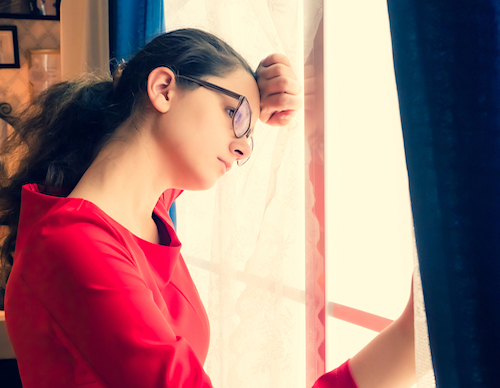A current New York Situations tale described that “Depression, self-hurt and suicide are soaring among the American adolescents.” Educators will need to make them selves completely mindful of the pandemic’s influence on psychological overall health and what might be a long restoration for several young ones in the middle.

Stroll by means of the halls of any middle school and you’re bound to notice whispering, “that appear,” and hurtful giggling. If you at any time experienced emotional suffering all through your middle years, these hallways can choose you back in time and serve as a not so mild reminder that lifestyle is challenging as an adolescent.
Not only are our center schoolers trying to determine out how to exist with their new and changing bodies even though undertaking their university perform and passing your classes, they are also finding out how to make just the right choice so that they do not completely ruin their social life.
Not to mention social media – with all its perils – staying out there specifically at their fingertips. Now, throw in a pandemic that boundaries access to what adolescents have always viewed as their “norm,” and we have fairly the social/psychological issues transpiring.
The Pandemic and Its Influence
When the pandemic commenced, all people was united. We all were being “in this collectively.” We manufactured signs, we sang together, we volunteered to enable our neighbors. We checked in on our beloved kinds.
But then – when we recognized this was not likely to be a quick-lived lifestyle adjust like we assumed – men and women commenced to stress and items commenced to warp and transform for the even worse. Let us take into account our adolescents.
Our young children in the middle had been now at property expanding up with their parents 24/7. Mothers and fathers were being now in charge of supporting their children’s discovering, a lot more so than they’d ever been needed to in the previous.
Young children who had been utilized to normal gatherings with mates, movies, school dances, sporting activities, and musicals were now figuring out how to continue to be protected at home with spouse and children who they may well or may well not have experienced a excellent marriage.
They also have been often predicted to have a digicam on in household options that probably they weren’t all set to share with peers or lecturers. And they had been predicted to display up at occasions based mostly on others’ schedules no matter of what else they may perhaps have been needing to do at property (e.g., using treatment of a youthful sibling although mom was on the web in a meeting she could not overlook).
Dad and mom also had been greatly impacted by the pandemic – and all of the modifications they faced in their do the job and their lives also altered regular parenting.
Dad and mom were being predicted to figure out how to juggle doing the job from household with little ones with basically no see or preparing or past expertise. Lots of mom and dad experienced confined or no internet link to assist on their own operating, allow alone to help their children access schoolwork.
Mom and dad were opened up to a full new environment of vulnerability them selves. Their colleagues noticed them in a number of roles, frequently on camera, and not in a favorable way. I try to remember becoming on a employees assembly with 30 or extra friends speaking on a subject matter working with the video clip on my cell phone (for the reason that I was just one of these mothers and fathers who could not get net any other way). At a single stage I stopped to yell to my 1-calendar year-old and four-yr-previous to get off of the desk or they may slide.
An additional moment, I was sitting in my closet trying not to be disturbed even though my daughter napped. I experienced my camera off but was requested to speak. As I turned on my camera I questioned for grace as they saw my dresses lying all about me in my headshot.
Not my most shining times. I’m guaranteed you had some of these way too. But we did what we could with what we experienced.
Now, take into consideration these improvements with each other. Our students and their mother and father knowledgeable intensive shifts that possible also impacted their relatives associations. Research has demonstrated that when we are emotion stressed, we wrestle to be empathetic and contemplate somebody else’s point of view (see this report on “How Anxiety Lowers Empathy”). When our adolescents essential a lot more empathy and being familiar with than at any time, people with whom they had the most relationship were typically below stress on their own and likely struggled to exhibit the legitimate knowledge they might have provided in other situations.
The Pandemic Shift in Mental Health and fitness
Looking at what adolescents and mothers and fathers went as a result of for the duration of this time, of study course there have been adjustments throughout our way of life and way of contemplating.
While kindness was coronary heart-warmingly current at the begin of the pandemic, knowing and grace shortly began to fade and our collective mental health and fitness took a toll. Our learners became nervous about the virus, about getting perform finished as expected in “virtual faculty,” and about whether or not items would ever return to the way they after ended up.
Many also turned frustrated – sensation as while their pandemic “resolve” did not evaluate up to their good friends or many others in their loved ones, overeating or undereating as a way to command some thing in their life, and experience unmotivated. What was the point in carrying out this get the job done, when joy appeared to be in the far off length?
Whilst in some methods our earth might look additional “back to normal” now, our grownup mind is nevertheless operating via all of the dissimilarities that took place during that time and go on to ripple by every day lifetime.
Then there’s our youth. They might be lacking the odd sense of liberty that arrived with isolation as properly as the time lost with mates all through the pandemic that they can never ever recuperate. They could not feel prepared to be absolutely “back to normal” due to the fact they are even now fearful about germs and obtaining sick. They might feel ill geared up to join in classroom things to do simply because social expertise have been reshaped above the earlier two several years (look at digital finding out behaviors vs. in-particular person anticipations).
There also has not been more than enough public discussion and evaluation of what we have been by means of and its effect. When there is a normal disaster or other major disaster, generally ideal observe implies we provide in relief workers to mentor folks through this incident we set up households that ended up immediately impacted with help to assistance them in the extensive phrase, and we pull with each other to build back our communities.
This wasn’t genuinely in a position to transpire for Covid-19 since every single person on this world was impacted in some capacity. Unfortunately, many of our young men and women have been especially vulnerable to the psychological wellness affect Covid-19 introduced.
Suicide and Self-Damage
Costs of suicide enhanced in 2020, and suicide was also detailed as the next most prevalent trigger of loss of life for youngsters aged 10-14. (To see far more statistics about suicide, go to cdc.org.)
As we look at the scenarios in which our adolescents have located them selves these final two yrs, we also will have to keep in mind that their brains are still creating. The mind features that specifically assist them in pondering by the repercussions of their actions are however evolving.
When our adolescents make possibilities, their decisions may not be fully thought through. A little something that in the minute feels like the most effective way to fix a difficulty could grow to be “a permanent option to a short-term pain.” This is a very concerning notion, and in no way more so than right now.
How We Can Assist
We can support by creating associations with our learners and listening to them with empathy. Believe back again to a time in your youth when you felt terribly vulnerable and remember that our college students who struggle with mental health and fitness are typically put in those people vulnerable scenarios day by day in university.
Just demonstrating up can be a get for these little ones. Remind them of that with an “I’m so glad you’re below now.” Other approaches that we can help pupil mental overall health include:
► Communicate about mental wellness overtly. Remind students that we all have to are inclined to our psychological wellbeing, just like our actual physical wellness, and when we come to feel harmful we need to search for assist and treatment.
► Normalize talking about feelings. Model for your learners how you realize modifications in your very own thoughts. Then request them how they are experience and permit them share out what took place that related to them feeling that way.
► Boost constructive self-appreciate and self-discuss. Many of our youngsters in the center are tough on them selves and have to have reminders of what is amazing about them. Really encourage them to produce vision boards or a collage of phrases and images that describe the ideal elements of them.
► Make statements about college student steps, not them as a individual. Share disappointment with the student’s choices, not who they are. (Oh shucks, I am let down that you forgot to provide in your research alternatively than, I’m definitely disappointed in you.)
► Exercise coping methods as a class, which includes:
-
- Deep respiration in a mindful way (Down Pet or Smiling Brain Application)
- Turning on quiet instrumental tunes even though executing independent do the job
- Course motion difficulties through supports like GoNoodle or by generating a Sensory Pathway
- Remind pupils that these and other positive actions will aid to produce endorphins which make us come to feel joyful and assistance us cope far better with strain.
(For additional tips, see my MiddleWeb short article on lessening college student trauma.)
Be a Relief Worker
Be there when our college students are having difficulties and be careful to not downplay their ache. The truth is we have only the vaguest plan what their life glimpse like outside the house of college. Just for the reason that you see that paper on imperialism as vital doesn’t indicate this is what is at the prime of their priority list right after two decades of dealing with the normalcy of their adolescent world slipping aside.
Appropriate now they may possibly be focused on surviving. We will need to be centered on supporting them do that.
Katelyn Oellerich, Ed.S. is a college psychologist in Mineral Position, WI in her 8th year and has had knowledge in both equally urban and rural options. Also see her MiddleWeb report Bringing A lot more Empathy into Your Classroom.
Katelyn has offered study concentrated on Mindfulness and Arranging and Organization Competencies and has added instruction in social-psychological learning, artwork therapy, trauma delicate colleges, People and Schools With each other, and gender inclusive procedures. Katelyn enjoys supporting scholar engagement by empowering relationships at college.

